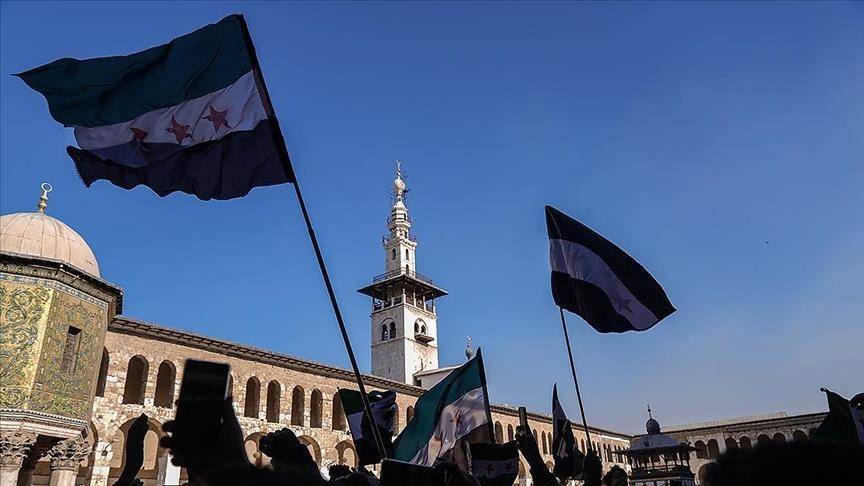ISTANBUL
After over five decades of dictatorship and 13 years of conflict, Syria faces a demolished infrastructure, destroyed buildings, hundreds of thousands of lives lost, and a collapsed economy.
The regime of Bashar al-Assad, who ruled for nearly 25 years, came to an end on Dec. 8 when anti-regime groups seized Damascus, forcing Assad to flee to Russia and marking the conclusion of the Baath Party’s control.
The regime’s attacks on infrastructure and the population to maintain power left the economy in shambles, while the civil war that began in 2011 further devastated Syria’s development and human resources.
The conflict has destroyed homes, businesses, schools, and electricity systems while displacing 6 million Syrians globally and 7 million internally.
Experts say it is challenging to quantify the full extent of economic destruction but emphasize the necessity of international efforts for reconstruction.
Last week, the UN humanitarian office highlighted a “clear need” to invest in Syria’s long-term stabilization, including rebuilding essential services such as electricity access and helping people secure incomes and livelihoods.
Key indicators
According to the World Bank’s latest report from mid-2024, approx 69% of Syrians live in poverty, with extreme poverty reaching 27%, up from negligible levels in 2009.
The war has pushed over a quarter of the population into extreme poverty, defined as living on less than $2 per day. By comparison, the global average of people in extreme poverty is 8.5%.
Syria’s GDP shrank by more than 85% from 2011 to 2023, dropping to $9 billion, with a further contraction of 1.5% projected for 2025.
Oil production plummeted from 383,000 barrels per day before the conflict to just 90,000 barrels per day in 2023. Once the largest oil exporter in the Eastern Mediterranean, Syria is now an oil importer, relying on shipments primarily from Iran.
From 2020 to 2023, oil imports nearly doubled, now accounting for almost half of domestic oil consumption.
The agricultural sector has also been severely impacted, with massive displacement of farmers and extensive damage to infrastructure and irrigation systems leading to reduced crop yields, according to the World Bank.
Foreign trade is in crisis, with collapsed domestic industrial and agricultural output increasing Syria’s reliance on imports.
The Syrian pound has suffered catastrophic losses, with its value falling by thousands of percent, including a 141% decline in 2023 alone. This currency collapse has fueled inflation rates ranging between 60% and 200% over the past five years.
Additionally, war-related damage to airports, the suspension of international flights, the end of tourism, halted foreign investment, increased borrowing costs, depleted reserves, and the destruction of economic credibility have further worsened the situation.
Steps toward recovery
Since Hayat Tahrir al-Sham (HTS) took control of Damascus last year and established an interim government, some economic indicators have improved.
Thanks to intensive aid efforts by Türkiye and Turkish NGOs, Syrians’ basic needs, such as food, are being met. Qatar has also emerged as a major donor, delivering tons of humanitarian aid and is expected to help fund civil servant salaries in Syria.
This week, Turkish Trade Minister Omer Bolat met with Turkish business leaders, industrialists, and NGOs to discuss Syria’s reconstruction and economic recovery. The Trade Ministry expressed strong support for cooperation in rebuilding Syria to establish sustainable state structures, peace, and security.
The Biden administration also announced a six-month sanctions relief measure to facilitate the delivery of humanitarian aid to Syria, signaling a shift in U.S. policy.
Experts emphasize that the removal of sanctions, reintegration into the global banking system, and access to international funds are crucial for Syria’s economic recovery. Without these measures, manufacturing, trade, and market revitalization remain impossible.
Damascus Governor Maher Marwan told Anadolu last month that national unity and attracting investments are top priorities for the new leadership. He stressed the importance of enhancing government efficiency, monitoring institutions, and building trust.
The new government has pledged to focus on reconstruction efforts by utilizing local resources, such as oil fields and agricultural land while appealing for humanitarian aid, foreign investments, and political support to lift sanctions.
The interim government has underlined its readiness to restore normalcy in Syria and called for international assistance to support a holistic recovery process.

